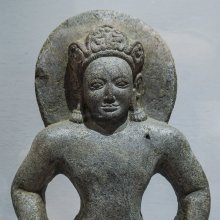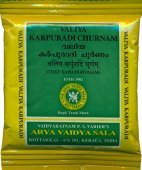Pashupati, Paśupati, Pasupati, Pashu-pati, Paśūpati: 21 definitions
Introduction:
Pashupati means something in Hinduism, Sanskrit, Buddhism, Pali, Marathi. If you want to know the exact meaning, history, etymology or English translation of this term then check out the descriptions on this page. Add your comment or reference to a book if you want to contribute to this summary article.
The Sanskrit terms Paśupati and Paśūpati can be transliterated into English as Pasupati or Pashupati, using the IAST transliteration scheme (?).
Images (photo gallery)
In Hinduism
Shilpashastra (iconography)
Source: Wisdom Library: Elements of Hindu IconograpyPaśupati (पशुपति):—One of the eight names of Rudra, given to him by Brahmā, according to the Pādma-purāṇa. This aspect became the presiding deity over the air. The corresponding name of the consort is Svāhā. His son is called Sarga.

Shilpashastra (शिल्पशास्त्र, śilpaśāstra) represents the ancient Indian science (shastra) of creative arts (shilpa) such as sculpture, iconography and painting. Closely related to Vastushastra (architecture), they often share the same literature.
Purana and Itihasa (epic history)
Source: archive.org: Shiva Purana - English Translation1) Paśupati (पशुपति) refers to one of the eight names of Śiva (śivanāma) and is mentioned in the Śivapurāṇa 1.20 while explaining the mode of worshipping an earthen phallic image (pārthiva-liṅga) according to the Vedic rites:—“[...] the eight names of Śiva viz:—Hara, Maheśvara, Śambhu, Śūlapāṇi, Pinākadhṛk, Śiva, Paśupati and Mahādeva shall be used respectively for the rites of bringing the clay, kneading, installation, invocation, ceremonial ablution, worship, craving the forbearance and ritualistic farewell. Each of the names shall be prefixed with Oṃkāra. The name shall be used in the dative case and Namaḥ shall be added to them. The rites shall be performed respectively with great devotion and joy. [...]”.
2) Paśupati (पशुपति) refers to the “lord of Paśus” and is used to describe Śiva, according to the Śivapurāṇa 2.5.9 (“Śiva’s campaign”).—Accordingly, as Śiva became the lord of the Paśus: “On hearing these words of lord Śiva, the great soul, Viṣṇu, Brahmā and other gods said.—‘So be it’. Hence all the gods and Asuras became the animals of the lord. Śiva became the lord of animals (paśupati). He is the person who unties the nooses of the animals. Then the name Paśupati, that bestows welfare, spread in all the worlds and became renowned. Then the celestial sage, Indra, Brahmā, Viṣṇu and others rejoiced shouting—‘Victory’. [...]”
Source: Cologne Digital Sanskrit Dictionaries: The Purana Index1a) Paśupati (पशुपति).—Fourth name of Śiva; the fifth tanu of Agni; has pacikaśakti; wife Svāhā and son Skanda;1 hence fire to be kept clean.2
- 1) Brahmāṇḍa-purāṇa II. 10. 80; Vāyu-purāṇa 27. 11, 53; 30. 89.
- 2) Brahmāṇḍa-purāṇa II. 10. 13 and 45.
1b) See Rudra;1 the presiding deity of fire.2
Source: JatLand: List of Mahabharata people and placesPaśūpati (पशूपति) is a name mentioned in the Mahābhārata (cf. XIV.8) and represents one of the many proper names used for people and places. Note: The Mahābhārata (mentioning Paśū-pati) is a Sanskrit epic poem consisting of 100,000 ślokas (metrical verses) and is over 2000 years old.
Source: Shodhganga: The saurapurana - a critical studyPaśupati (पशुपति) is the deity to be worshipped in the month Jyeṣṭha for the Anaṅgatrayodaśī-Vrata, according to the 10th century Saurapurāṇa: one of the various Upapurāṇas depicting Śaivism.—Accordingly, the Anaṅgatrayodaśī-vrata is observed in honour of Śiva for acquiring virtue, great fortune, wealth and for destruction of sins [...] This vrata is to be performed for a year from Mārgaśīra.—In Jyeṣṭha, the tooth brush is that of plakṣa wood, food is śṛṅgodaka of cow, the deity is Paśupati, the stay near the deity gives the result of donating thousand of cows.

The Purana (पुराण, purāṇas) refers to Sanskrit literature preserving ancient India’s vast cultural history, including historical legends, religious ceremonies, various arts and sciences. The eighteen mahapuranas total over 400,000 shlokas (metrical couplets) and date to at least several centuries BCE.
Shaivism (Shaiva philosophy)
Source: Wisdom Library: ŚaivismPaśupati (पशुपति) is the Sanskrit name of a deity presiding over Nepāla, one of the sixty-eight places hosting a svāyambhuvaliṅga, which is one of the most sacred of liṅgas according to the Śaivāgamas. The list of sixty-eight svāyambhuvaliṅgas and presiding deities (e.g., Paśupati) is found in the commentary on the Jirṇoddhāra-daśaka by Nigamajñānadeva. The word liṅga refers to a symbol used in the worship of Śiva and is used thoughout Śaiva literature, such as the sacred Āgamas.
Source: Archaeological Survey of India: Śaiva monuments at Paṭṭadakal (śaivism)Paśupati (पशुपति).—Owing to ignorance human beings are caught entangled in a circle of life and death. Human beings are paśu animals and are bound by pāśa bonds and it is Śiva who cuts off these bonds. That is the reason why He is called Paśupati.

Shaiva (शैव, śaiva) or Shaivism (śaivism) represents a tradition of Hinduism worshiping Shiva as the supreme being. Closely related to Shaktism, Shaiva literature includes a range of scriptures, including Tantras, while the root of this tradition may be traced back to the ancient Vedas.
General definition (in Hinduism)
Source: Shodhganga: The saurapurana - a critical study (h)Paśupati (पशुपति) is a form of Śiva.—The Ṛgveda describes Rudra as Paśupati in a more or less general way although he is more closely connected with cattle but the Atharvaveda mentions cows, horses, goats, sheep and dogs, also deer, ducks, birds and vultures, dolphins, pythons and fish. The Vājasaneyīsaṃhitā connects Rudra with snakes and monsters. In the Śatapathabrāhmaṇa
(2.6.2.2) the mole (ākhu) is the animal of Śiva. Later the mole is specifically allotted to Gaṇeśa, Śivas Puranic and post-Puranic son. In the Yajurveda, Atharvaveda, Śatapathabrāhmaṇa and Āśvalāyana-Gṛhyasūtra (4.8.19), Paśupati is a form of Rudra.
Languages of India and abroad
Pali-English dictionary
Source: BuddhaSasana: Concise Pali-English Dictionarypasupati : (m.) the god īsvara.

Pali is the language of the Tipiṭaka, which is the sacred canon of Theravāda Buddhism and contains much of the Buddha’s speech. Closeley related to Sanskrit, both languages are used interchangeably between religions.
Marathi-English dictionary
Source: DDSA: The Molesworth Marathi and English Dictionarypaśupati (पशुपति).—m (S) A name of Shiva as Lord of all living creatures.
Source: DDSA: The Aryabhusan school dictionary, Marathi-Englishpaśupati (पशुपति).—m A name of Shiva as Lord of all living creatures. Blockhead.
Marathi is an Indo-European language having over 70 million native speakers people in (predominantly) Maharashtra India. Marathi, like many other Indo-Aryan languages, evolved from early forms of Prakrit, which itself is a subset of Sanskrit, one of the most ancient languages of the world.
Sanskrit dictionary
Source: DDSA: The practical Sanskrit-English dictionaryPaśupati (पशुपति).—
1) an epithet of Śiva; Meghadūta 38,58; पशुपतिरपि तान्यहानि कृच्छ्रादगमयदद्रिसुतासमा- गमोत्कः (paśupatirapi tānyahāni kṛcchrādagamayadadrisutāsamā- gamotkaḥ) Kumārasambhava 6.95. कस्त्वं (kastvaṃ) ? शूली (śūlī),.........पशुपतिर्नैव दृश्ये विषाणे (paśupatirnaiva dṛśye viṣāṇe) Subhāṣ.
2) a herdsman, owner of cattle.
3) Name of a philosopher who taught the philosophical doctrine called पाशुपत (pāśupata); see Sarva. S. ad loc.
Derivable forms: paśupatiḥ (पशुपतिः).
Paśupati is a Sanskrit compound consisting of the terms paśu and pati (पति).
Source: Cologne Digital Sanskrit Dictionaries: Shabda-Sagara Sanskrit-English DictionaryPaśupati (पशुपति).—m.
(-tiḥ) 1. A herdsman. 2. A name of Siva. E. paśu living creature, and pati the master, the creator, or preserver; or paśu Siva'S attendant, and pati master; or according to one legend, paśu an animal, which every deity acknowledged himself to be before his lord and master Siva, when they solicited him to destroy the Asura Tripura.
Source: Cologne Digital Sanskrit Dictionaries: Benfey Sanskrit-English DictionaryPaśupati (पशुपति).—m. a name of Śiva.
Paśupati is a Sanskrit compound consisting of the terms paśu and pati (पति).
Source: Cologne Digital Sanskrit Dictionaries: Cappeller Sanskrit-English DictionaryPaśupati (पशुपति).—[masculine] lord of the animals, [Epithet] of [several] gods.
Source: Cologne Digital Sanskrit Dictionaries: Aufrecht Catalogus Catalogorum1) Paśupati (पशुपति) as mentioned in Aufrecht’s Catalogus Catalogorum:—from Malaya, father of Nārāyaṇa (Śāṅkhāyanasūtrapaddhati). W. p. 29.
2) Paśupati (पशुपति):—Kārakaparīkṣā [grammatical] Report. Xviii.
3) Paśupati (पशुपति):—Pravarādhyāya. L. 2248.
4) Paśupati (पशुपति):—Ratnamālā, on precious stones.
5) Paśupati (पशुपति):—son of Dhanaṃjaya, brother of Īśāna and Halāyudha: Daśakarmadīpikā or Daśakarmapaddhati. Quoted in Śuddhikaumudī, by Raghunandana Oxf. 292^a. Śrāddhapaddhati. Mentioned in Halāyudha’s Brahmaṇasarvasva.
6) Paśupati (पशुपति):—Piṅgalaṭīkā (on Prākṛtapiṅgala).
Source: Cologne Digital Sanskrit Dictionaries: Monier-Williams Sanskrit-English Dictionary1) Paśupati (पशुपति):—[=paśu-pati] [from paśu > paś] m. ‘lord of animals’ (or ‘l° of a servant named Paśu’ or ‘l° of the soul’ [Religious Thought and Life in India 89]), Name of the later Rudra-Śiva or of a similar deity (often associated in the Veda with Bhava, Śarva, Ugra, Rudra, Mahā-deva, Īśāna and others who together with Bhīma are in later times regarded as manifestations of Rudra), [Atharva-veda] etc. etc.
2) [v.s. ...] of Agni.; [Taittirīya-saṃhitā; Śatapatha-brāhmaṇa]
3) [v.s. ...] of Śiva, [Mahābhārata] etc. (according to one legend every deity acknowledged himself to be a mere paśu or animal when entreating Śiva to destroy the Asura Tri-pura)
4) [v.s. ...] of a lexicographer
5) [v.s. ...] of a Scholiast etc.
Source: Cologne Digital Sanskrit Dictionaries: Yates Sanskrit-English DictionaryPaśupati (पशुपति):—[paśu-pati] (tiḥ) 2. m. Shiva.
[Sanskrit to German]
Sanskrit, also spelled संस्कृतम् (saṃskṛtam), is an ancient language of India commonly seen as the grandmother of the Indo-European language family (even English!). Closely allied with Prakrit and Pali, Sanskrit is more exhaustive in both grammar and terms and has the most extensive collection of literature in the world, greatly surpassing its sister-languages Greek and Latin.
Kannada-English dictionary
Source: Alar: Kannada-English corpusPaśupati (ಪಶುಪತಿ):—[noun] Śiva, the lord of all human beings.
--- OR ---
Pasupati (ಪಸುಪತಿ):—[noun] Śiva, the lord of all human beings.
--- OR ---
Pāśupati (ಪಾಶುಪತಿ):—[noun] = ಪಾಶುಪತ [pashupata]2 - 2.
Kannada is a Dravidian language (as opposed to the Indo-European language family) mainly spoken in the southwestern region of India.
See also (Relevant definitions)
Partial matches: Pashu, Pacu, Pati.
Starts with: Pashupatidhara, Pashupatinagara, Pashupatinatha, Pashupatipriya, Pashupatipurana, Pashupatisharman, Pashupatishastra, Pashupatishvaramahatmya.
Ends with: Abhiramapashupati.
Full-text (+58): Pashupata, Pancarthika, Pashupatavratin, Mahapashupata, Mrigasthali, Shaivapashupata, Pashupatipurana, Pashupatidhara, Pashupatisharman, Pashupatinatha, Pashupatishastra, Pashupatinagara, Svaha, Devasu, Pashupatishvaramahatmya, Pashupatyashktaka, Maheshvarasiddhanta, Pashupa, Pashu, Pashubharta.
Relevant text
Search found 74 books and stories containing Pashupati, Paśupati, Pasupati, Pashu-pati, Paśūpati, Paśu-pati, Pasu-pati, Paśū-pati, Pāśupati; (plurals include: Pashupatis, Paśupatis, Pasupatis, patis, Paśūpatis, Pāśupatis). You can also click to the full overview containing English textual excerpts. Below are direct links for the most relevant articles:
Rudra-Shiva concept (Study) (by Maumita Bhattacharjee)
2. Vājasaneyi-saṃhitā (c): Oblations to different names of Rudra < [Chapter 2 - Rudra-Śiva in the Saṃhitā Literature]
3. The God Rudra-Śiva: His Prominence < [Chapter 1 - Introduction]
2.4. Rudra as Paśupati and Bhūtapati < [Chapter 6a - The Epithets of Rudra-Śiva]
The Linga Purana (by J. L. Shastri)
Chapter 34 - Praise of the Yogin (yogi-praśaṃsānāma) < [Section 1 - Uttarabhāga]
Chapter 45 - The mode of performing Jīvacchrāddha rite < [Section 2 - Pūrvabhāga]
Chapter 108 - Glory of the Pāśupata-Vrata < [Section 1 - Uttarabhāga]
Lakulisha-Pashupata (Philosophy and Practice) (by Geetika Kaw Kher)
The Spread and Transition of Lakulisa-Pasupata Order < [Chapter 2 - Spread and Transition]
An insight into Asceticism < [Chapter 3 - The Ritualistic Context]
Critical rereading of Pasupata-sutra < [Chapter 4 - The Philosophical Context]
Garga Samhita (English) (by Danavir Goswami)
Verse 8.13.86 < [Chapter 13 - A Thousand Names of Lord Balarāma]
List of Mahabharata people and places (by Laxman Burdak)
Sivaprakasam (Study in Bondage and Liberation) (by N. Veerappan)
Introduction (The concept of God) < [Chapter 4 - Concept of God]
Related products



